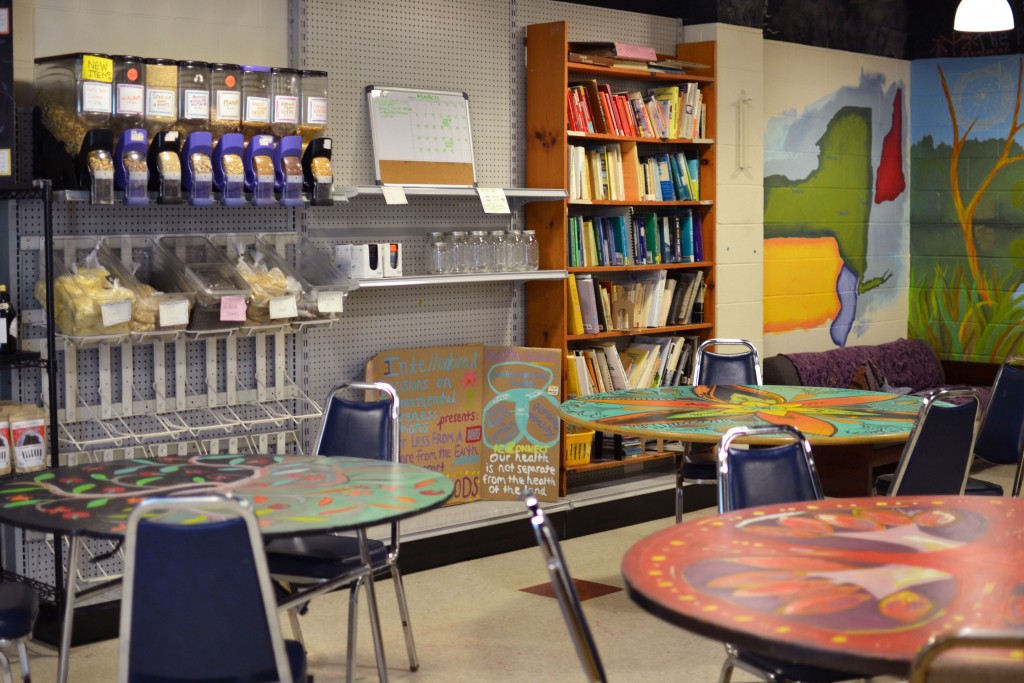
In 1975 a group of students, looking for an alternative food option that provided local, organic meals, founded the Food Co-Op at Binghamton University.
Today, the Roots Café, located in the basement of the Union, serves freshly prepared food on Tuesday through Friday. The menu changes daily, and students can also purchase avocados, bananas and other produce as well as bulk items such as granola and oatmeal.
The Food Co-Op serves primarily as a business — almost all the food comes from local farm shares, is prepared in the mornings and sold by weight throughout the day. The Co-Op also functions as a social club, with an e-board that puts on informational events, including guest speakers and film screenings.
Operating on a $4,000 annual budget from the Student Association (SA), the Co-Op spent most of the money on startup costs every year. The rest of the money went towards social events, which have high costs because they are free, but the Co-Op still provides food. Starting next semester, however, the amount of money they receive from the SA will be $0.
Kate Tashman, the SA vice president for finance and a junior double-majoring in biomedical engineering and mathematics, said that the reason they lost their funding is due to the combination of being a business and a social group.
“They viewed themselves as a student group mixed with a business, whereas from an auditing perspective a business needs to be completely different from our student groups,” Tashman said. “They were thinking ‘our student group budget has been taken away,’ but no, we took away the budget of a business.”
No student groups which function as businesses on campus receive money from the SA. The funds, which come from the student activity fee, are reserved for social clubs which don’t make a profit. But according to Jowell Padro, the president of the Food Co-Op and a senior double-majoring in comparative literature and Latin American and Caribbean Area Studies, their purpose has never been to make money as a business.
“Our goal is not to make a profit, it’s to provide a food alternative,” Padro said. “We’re not interested in being a business with a big profit, because if that was the case our food wouldn’t be accessible to people, and that really is our goal.”
In response to the loss of funds, the Food Co-Op plans to restructure their organization. A new social group, called Students for Ethical Living and Food (SELF) is being founded. The Co-Op will function as an autonomous business, and SELF will serve as a new social group that provides the volunteer workforce for the Co-Op. There are currently around 15 volunteers, who take shifts in the kitchen and at the register, and the hope is that SELF will increase that number.
“What SELF is going to do is recruit volunteers and market the Co-Op,” Padro said. “[It will] very much use the Co-Op as a platform to facilitate the mission statement of what the Co-Op and what SELF shares, which is ethical living, sustainable food and food alternatives.”
The hope is that SELF, as a social group, will be able to receive funding from the SA in the future. The Co-Op would still have to operate on it’s own, which would entail increasing their revenue to account for start-up costs. According to Tashman, while still maintaining the culture of the Co-Op, tweaks to their business model would allow this to work.
“This is a time for them to start and try to be more profitable, like our other businesses, so they don’t need a budget,” Tashman said. “Maybe change their business model a little bit just because times have changed, but at the same time keep that feel of the food Co-Op and really keep the spirit of it because that’s what draws people to it.”
Emily D’Emic, a senior majoring in English, frequents the Co-Op and also used to volunteer in the kitchen. She said that the type of food offered there is hard to come by in other places at BU.
“I think it offers a lot of vegetarian and vegan options that aren’t available anywhere else,” D’Emic said. “It also provides a cheap, healthy food that’s hard to come by other places on campus.”
In the end, Padro said that he hopes the Co-Op can survive as an alternative to Sodexo.
“The food just tastes much better, it’s clean, it’s organic,” Padro said. “Everything about our food is what you want to eat and how food should be.”


